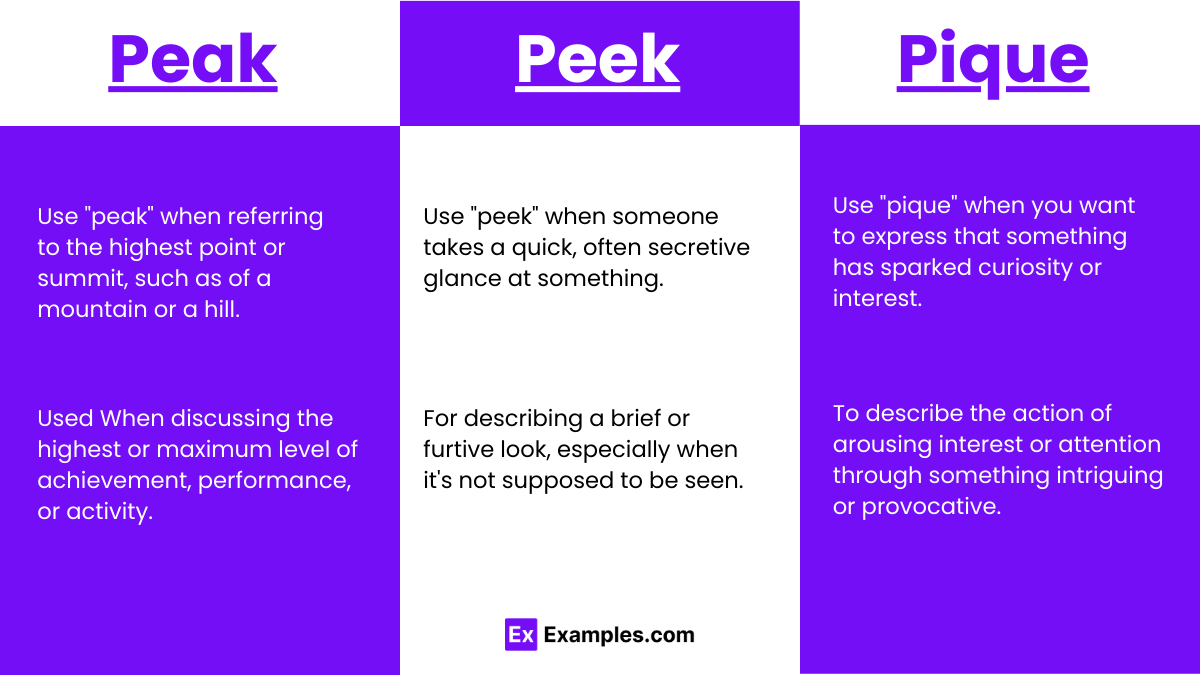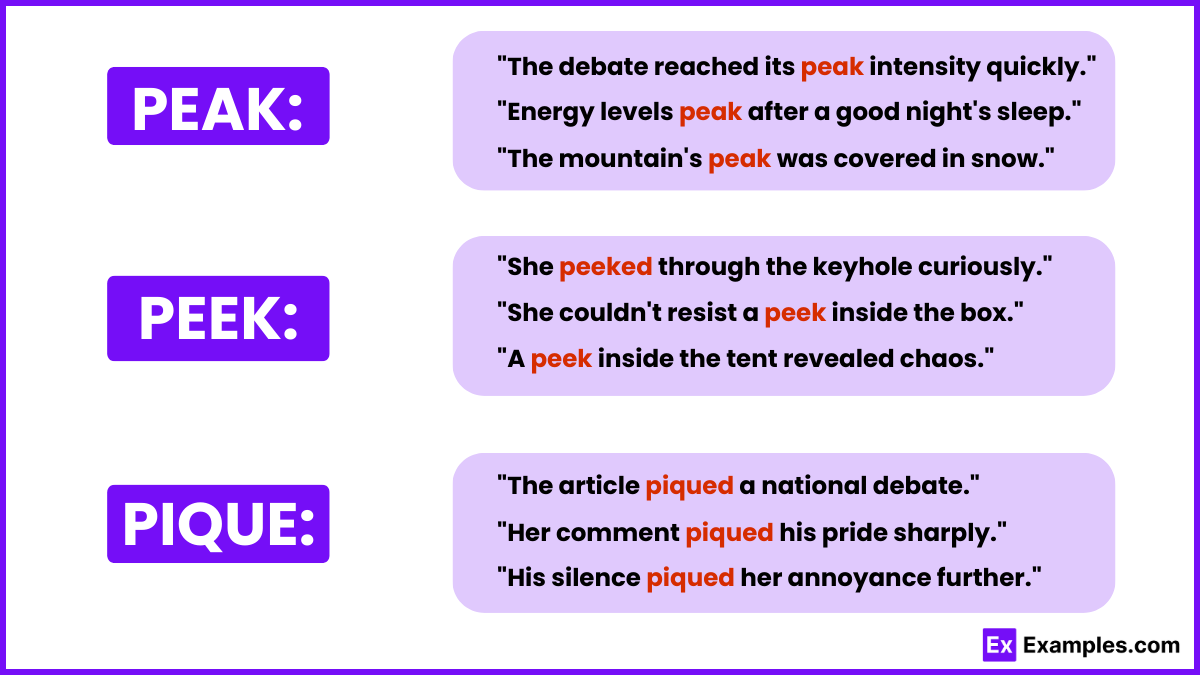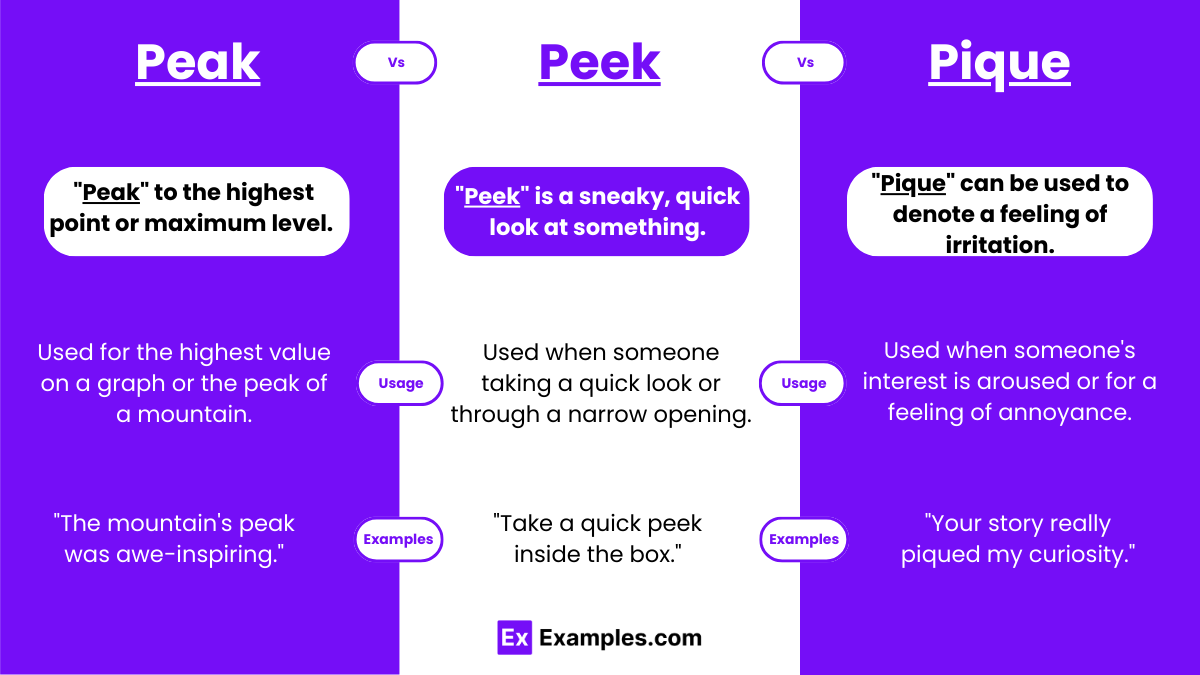Peak vs Peek vs Pique – Meanings, Difference, Examples & Usage
“Peak,” “peek,” and “pique” are three words that sound the same but have different meanings. “Peak” is like the top of a mountain, the highest or best part of something. “Peek” is when you take a quick look at something, often secretly. “Pique” is a bit tricky; it can mean to make someone interested in something or to make them feel annoyed. It’s important to know the difference so you can use the right word at the right time.
Peak, Peek, and Pique – Meanings
- Peak: This term often refers to the highest point or maximum level of something, such as the peak of a mountain or the peak of one’s career. It signifies a pinnacle or a point of greatest achievement or value.
- Peek: To “peek” means to take a quick or secretive look at something. This action involves glancing at something briefly, usually without being noticed or without fully revealing oneself.
- Pique: Pique can be used to denote a feeling of irritation or resentment stemming from wounded pride, or to arouse interest or curiosity. As a verb, it’s often used in phrases like “pique one’s interest” or “pique one’s curiosity.”
Summary
“Peak,” “peek,” and “pique” might sound the same, but they’re totally different players in the word game. “Peak” is like the top of a mountain, the highest point you can reach. Think of a mountain peak. “Peek” is a sneaky, quick look at something when you’re curious. Like peeking through a keyhole. And “pique”? That’s when something really grabs your attention or makes you a bit annoyed, sparking your interest or irritation. So, remember: reach the “peak,” take a “peek,” and let your curiosity get “piqued.” No more mix-ups!
How to Pronounce Peak, Peek, and Pique
- Peak: Pronounced as /piːk/, with a long ‘ee‘ sound, emphasizing the concept of reaching the highest point.
- Peek: Also pronounced as /piːk/, identical to “peak,” but its usage in context reveals its unique meaning related to looking quickly.
- Pique: Pronounced as /piːk/ or /pik/, similar to the others, yet its distinct meaning in context sets it apart, especially in phrases that involve stimulating interest or irritation.
Differences between Peak, Peek, and Pique
| Aspect | Peak | Peek | Pique |
|---|---|---|---|
| Definition | Refers to the highest point or maximum level. | Means to glance quickly or secretly. | Denotes arousal of interest or irritation. |
| Specificity | Used to denote culmination or apex. | Involves a brief or covert act of looking. | Invokes emotional or intellectual response. |
| Context | Often related to achievements or natural heights. | Associated with actions of observation. | Linked to emotions or mental engagement. |
| Usage | Descriptive of levels or achievements. | Descriptive of actions of looking. | Descriptive of emotional or intellectual states. |
| Grammatical Form | Can be a noun or verb. | Primarily used as a verb. | Can be a noun or verb, depending on context. |
How to Remember the Difference between Peak, Peek, and Pique
Think of “peak” as the top of a mountain, “peek” as taking a quick look around a corner, and “pique” as provoking interest or irritation. Remembering these visual or emotional cues can help differentiate and use these words correctly.
When to Use Peak, Peek, and Pique

Usage of Peak
- Highest Point: Use “peak” when referring to the highest point or summit, such as of a mountain or a hill. For example, “We reached the peak of Mount Everest.”
- Maximum Level: When discussing the highest or maximum level of achievement, performance, or activity. For instance, “The athlete performed at his peak during the championship.”
- Prime Time: It can denote the most intense or important period of time, like “peak hours” for traffic or “peak season” for tourism.
- To Reach the Top: As a verb, “peak” can describe reaching a highest point, either literally or figuratively. “Interest in the show peaked during its finale.”
Usage of Peek
- Quick Look: Use “peek” when someone takes a quick, often secretive glance at something. “She took a peek at the surprise gift before the party.”
- Sneak a Glance: For describing a brief or furtive look, especially when it’s not supposed to be seen. “He peeked through the curtains to see if it was raining.”
- Preview: In contexts where you’re given a brief glimpse or preview of something yet to fully emerge or be disclosed. “The director offered a sneak peek of the new film.”
- Peeking Out: When a small part of something is becoming visible, not fully out in the open. “The sun peeked out from behind the clouds.”
Usage of Pique
- Stimulate Interest: Use “pique” when you want to express that something has sparked curiosity or interest. “The mysterious map piqued her curiosity.”
- Cause Resentment: It can also refer to feeling irritated or annoyed by something. “His dismissive attitude piqued her.”
- Intrigue: To describe the action of arousing interest or attention through something intriguing or provocative. “The enigmatic poem piqued my interest in the author’s other works.”
- Peak of Irritation: Although less common, it can be used to describe reaching a point of irritation. “The constant delays finally piqued his patience.”
How to Use Peak, Peek, and Pique
Using Peak
- As a Noun: When used as a noun, “peak” refers to the highest point or maximum level of something. In a sentence, it can serve as the subject, object, or complement. For example, “The peak of the mountain was covered in snow.”
- As a Verb: As a verb, “peak” describes the action of reaching the highest point or maximum level. It usually acts as the main verb in a sentence. For instance, “The athlete peaked in her performance during the finals.”
Using Peek
- As a Verb: “Peek” is primarily used as a verb, indicating the action of looking quickly or furtively at something. It often requires an object to complete its meaning, making it a transitive verb. Example: “She peeked through the keyhole to see what was happening inside the room.”
Using Pique
- As a Verb: As a verb, “pique” means to arouse interest or to provoke a feeling, usually curiosity or irritation. It is often used transitively, needing an object to receive the action. For example, “The mysterious letter piqued his curiosity.”
- As a Noun: Less commonly, “pique” can also be a noun, denoting a feeling of irritation or resentment. However, this usage is relatively rare and often seen in more formal or literary contexts. For instance, “His dismissive comments left her in a state of pique.”
Peak, Peek, and Pique – Examples

Examples of Peak
- “The hikers were exhausted but exhilarated when they finally reached the peak of the mountain.”
- “During the peak hours of the day, the city streets are bustling with activity.”
- “His career hit its peak in the 1990s, when he won several prestigious awards.”
- “Interest in the online course peaked just after the promotional webinar.”
- “The peak of the epidemic saw hundreds of new cases being reported daily.”
Examples of Peek
- “Curious, the child couldn’t resist a peek through the fence to see the puppy next door.”
- “She opened the oven door to peek at the cake, ensuring it wasn’t burning.”
- “From behind the curtain, he took a quick peek at the audience before the show started.”
- “The first peek of dawn brought a beautiful orange hue to the sky.”
- “I’ll give you a sneak peek of the gift, but don’t tell anyone yet!”
Pique – Examples
- “The mysterious map found in the attic piqued her curiosity about her grandmother’s past.”
- “His abrupt departure from the meeting piqued everyone’s interest, leaving them wondering what had happened.”
- “The novel’s intricate plot piqued my interest from the very first page.”
- “The artist’s unique approach to traditional themes piqued the critics’ curiosity.”
- “His indifferent attitude piqued her, leading to a misunderstanding between them.”
Synonyms
| Term | Synonyms |
|---|---|
| Peak | Apex, summit, pinnacle |
| Peek | Glance, glimpse, peep |
| Pique | Stimulate, irritate, provoke |
Exercise
Fill in the blanks with either “peak,” “peek,” or “pique” to complete the sentences accurately.
- The hikers reached the mountain’s _____ just before noon.
- I couldn’t help but _____ at the presents under the tree.
- The intriguing book cover _____ my interest.
- The athlete’s performance is at its _____ this season.
- His dismissive attitude quickly _____ her annoyance.
Answers
- peak
- peek
- piqued
- peak
- pique
FAQ’S
Is It Pique or Peak Interest?
It’s “pique interest,” meaning to stimulate curiosity. “Peak” refers to a high point, not arousal of interest.
Is Curiosity Peaked or Piqued?
Curiosity is “piqued.” It means to arouse interest or curiosity, not reaching a high point, which “peaked” implies.
Is Peek the Same as Peak?
No, “peek” means a quick look, while “peak” refers to the highest point or maximum level of something.
How Do You Use Peak, Peek, and Pique in a Sentence?
“Reaching the mountain’s peak was thrilling. I took a peek at the view. The adventure piqued my interest in hiking.”
What’s the Difference Between Pique and Peek?
“Pique” means to stimulate interest or irritation, while “peek” is a quick or secretive glance.


